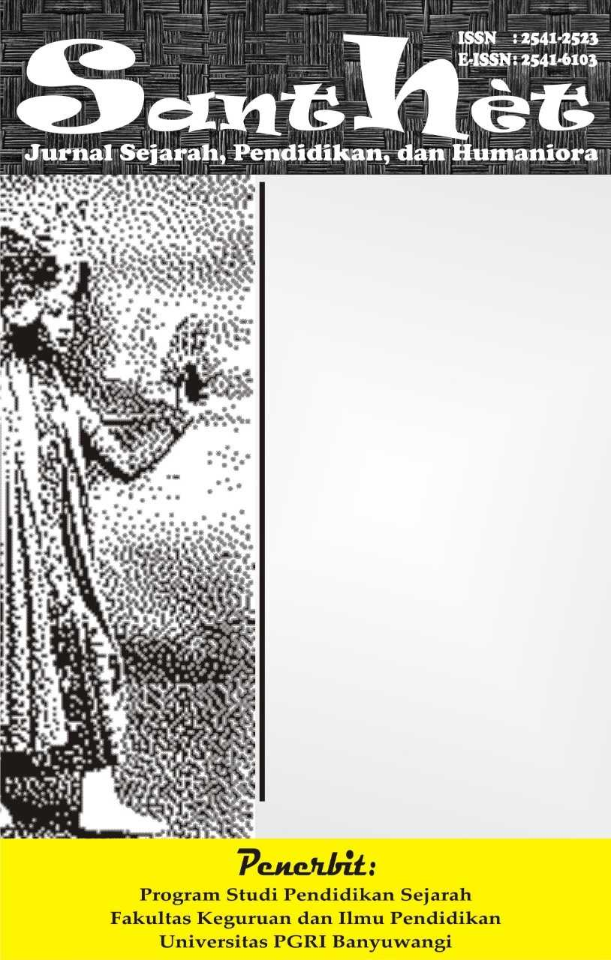DEVELOPMENT STRATEGY FOR MARINE TOURISM AT KOMBI BEACH IN NORTH SULAWESI
Strategi Pengembangan Wisata Bahari Pantai Kombi di Sulawesi Utara
DOI:
https://doi.org/10.36526/santhet.v8i2.4566Keywords:
Wisata Bahari, Potensi, Strategi Pengembangan, Pantai Kombi, Sulawesi UtaraAbstract
Marine tourism is an important contributor to the global economy that relies heavily on the preservation of coastal resources (Gössling, Hall, and Scott 2018). Kombi Beach, which is located in Kombi District, is not only known by local tourists, but also begins to attract the attention of foreign tourists. However, the development of marine tourism on Kombi Beach still faces various challenges, including limited infrastructure, suboptimal promotion, and public awareness of the importance of sustainable tourism. However, despite having various advantages, Kombi Beach still faces a number of challenges that need to be overcome in order to compete with other tourist destinations around it. The data analysis in this study uses SWOT analysis. Based on the results of the SWOT analysis for the marine tourism development strategy on Kombi Beach, which resulted in several important points. First, the strength of Kombi Beach lies in its unique natural beauty, climate that supports tourism throughout the year, as well as support from the government and local communities. Second, the weaknesses faced include limited supporting infrastructure, less than optimal promotion, and the quality of human resources in the tourism sector that need to be improved. Furthermore, the opportunities that exist include increasing marine tourism trends, potential investment from the private sector, and advances in digital technology that can increase promotion. However, the challenges that must be watched out for are competition with other tourist destinations, potential environmental damage, and economic instability that can affect tourist visits. Based on the analysis, the recommended development strategy is an aggressiveness (SO) strategy. Steps that can be taken include the development of integrated tour packages that combine natural and cultural activities, utilizing digital promotion with government support, involving local communities in tourism efforts, and collaborating with the government to improve transportation access
References
Afouxenidi, Elena. 2022. “The Role of the Local Community in Sustainable Cultural Tourism.” In Planning and Managing Sustainability in Tourism: Empirical Studies, Best-Practice Cases and Theoretical Insights, edited by Anna Farmaki, Levent Altinay, and Xavier Font, 169–86. Cham: Springer International Publishing. https://doi.org/10.1007/978-3-030-92208-5_11.
Benzaghta, Mostafa Ali, Abdulaziz Elwalda, Mousa Mousa, Ismail Erkan, and Mushfiqur Rahman. 2021. “SWOT Analysis Applications: An Integrative Literature Review.” Journal of Global Business Insights 6 (1): 55–73. https://doi.org/10.5038/2640-6489.6.1.1148.
Casimiro, Daniela, Maria Anunciação Ventura, Andrea Zita Botelho, and José Guerreiro. 2022. “Ecotourism in Marine Protected Areas as a Tool to Valuate Natural Capital and Enhance Good Marine Governance: A Review.” Frontiers in Marine Science 9 (February): 1–15. https://doi.org/10.3389/fmars.2022.1002677.
Dapas, Tilaar, and Mononimbar. 2020. “Analisis Kawasan Pariwisata Pesisir Pantai Di Kecamatan Kombi Kabupaten Minahasa.” Jurnal Spasial 7 (2): 218–27.
Gössling, Stefan, C Michael Hall, and Daniel Scott. 2018. “Coastal and Ocean Tourism.” In Handbook on Marine Environment Protection : Science, Impacts and Sustainable Management, edited by Markus Salomon and Till Markus, 773–90. Cham: Springer International Publishing. https://doi.org/10.1007/978-3-319-60156-4_40.
Kamagi, J. W.A., S. R.P. Sitorus, H. S. Arifin, and H. Hardjomidjojo. 2022. “Management Strategy for Marine Tourism in Bunaken National Park North Sulawesi Province.” IOP Conference Series: Earth and Environmental Science 1109 (1). https://doi.org/10.1088/1755-1315/1109/1/012048.
Lasally, Adesty, Lutfi Handayani, and Samsul Arifin. 2023. “The Role of the ASEAN Tourism Forum (ATF) in Supporting Indonesian Tourism.” Journal of Gastro Tourism 1 (1): 43–51. https://doi.org/10.52465/jogasto.v1i1.147.
Mustafa, Faizan Hasan, and Awangku Hassanal Bahar Pengiran Bagul. 2020. “Sustainable Coastal and Marine Ecotourism: Opportunities and Benefits.” In Life Below Water, edited by Walter Leal Filho, Anabela Marisa Azul, Luciana Brandli, Amanda Lange Salvia, and Tony Wall, 1–11. Cham: Springer International Publishing. https://doi.org/10.1007/978-3-319-71064-8_103-2.
Nguyen, Quang Hai. 2021. “Impact of Investment in Tourism Infrastructure Development on Attracting International Visitors: A Nonlinear Panel ARDL Approach Using Vietnam’s Data.” Economies 9 (3). https://doi.org/10.3390/economies9030131.
Northrop, Eliza, Peter Schuhmann, Lauretta Burke, Alan Fyall, Sergio Alvarez, Anna Spenceley, Susanne Becken, et al. 2022. “Opportunities for Transforming Coastal and Marine Tourism: Towards Sustainability, Regeneration and Resilience,” 12. https://oceanpanel.org/wp-content/uploads/2022/06/22_REP_HLP-Tourism_ES_revised-names.pdf.
Pham, Thuy Thi Thanh. 2020. “Tourism in Marine Protected Areas: Can It Be Considered as an Alternative Livelihood for Local Communities?” Marine Policy 115: 103891. https://doi.org/10.1016/j.marpol.2020.103891.
Swarbrooke, John Steven. 2020. “The Tourism Industry and the Marine Environment.” The Impact of Tourism on the Marine Environment. https://api.semanticscholar.org/CorpusID:225314585.
Treviño, Estibaliz, David Hoyos, and Elisa de Murieta. 2022. “Economic Valuation of Ocean-Based and Ocean-Related Tourism and Recreation.” In The Blue Economy: An Asian Perspective, edited by Somnath Hazra and Anindya Bhukta, 221–43. Cham: Springer International Publishing. https://doi.org/10.1007/978-3-030-96519-8_13





























